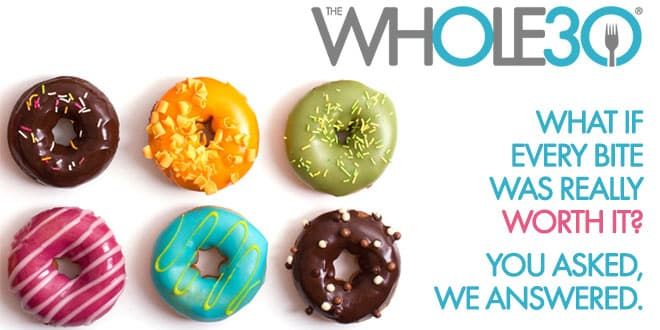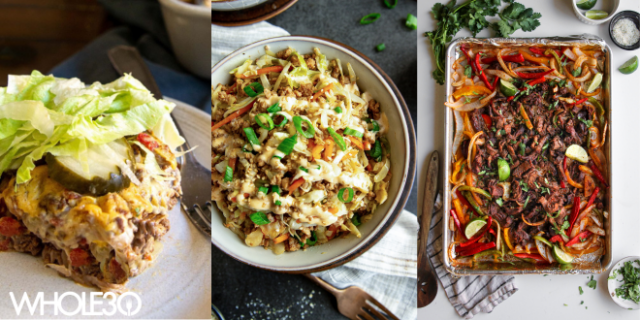From Melissa Hartwig, who (thanks to the Whole30) is one of those annoying people who really can eat just one square of dark chocolate
After an interesting experience at Blue Star Donut in Portland, I posted my “One Bite Rule” on Instagram. I encourage you to read the whole post (and the experience that prompted it), but I’ll summarize it here: If you get one bite into a less healthy treat and realize it’s not worth it, stop eating. The whole point of eating something that makes you less healthy is that you’re going to enjoy it so much, the consequences will be worth it. So if you discover it’s not as tasty as you had hoped, what’s the point?
This prompted a good question from two members of my Instagram community. First, @saradomz commented, “But what if the donuts are never NOT worth it? Then what?” And later, @wholecoop4 wrote (in her own post), “What if EVERY bite tastes ‘worth it’? What if EVERY bite of something less healthy is blissful and delicious? Is it okay to eat an endless amount of it?”
Interesting questions, right? So interesting I decided to write an entire article about it.
Every Bite WON’T Be Delicious
First, the idea that every single bite (or sip) of a less healthy treat will be worth it from now until infinity is just wrong. Think about the last absolutely incredible, totally worth it, blissful less-healthy food experience you had. For me, it was a goldenrod and lavender yogurt cake dessert confection at RN74 in San Francisco. I would have married that cake, I loved it so much. But because I ate is slowly, savoring every bite and then asking myself, do I really want another, I was able to note when the bites started tasting slightly less delicious, and stop when I had enough of the taste and the experience.
In both economics and food, we all have a set “bliss point”—a quantity of consumption where any further increase makes you less satisfied. In food, it’s the point at which sweet things are too sweet, savory things are too savory, and things can quickly cross into “too salty” territory. Maybe that’s four bites in (some things are so rich, you just don’t want to eat a lot of it), or maybe it’s 20 bites in and you order a second dessert.
But if you’re really paying attention and savoring the experience, you’ll know when enough is enough.
I’m not just talking about the reward sensations of eating sugar, salt, and fat. You have to think beyond your brain in this instance (I know that’s a silly thing to say, but bear with me) and evaluate the entire experience, not just the reward sensations. This comes with practice and awareness.
I wanted to savor that dessert because it came at the end of an incredible meal, was shared with a friend, and was truly, incredibly delicious. But I didn’t need to eat the whole thing to make that experience complete for me. I not only evaluated when the flavor stopped being quite as delicious, I asked myself, “Have I had enough to satisfy the experience I wanted to have?” When both of those things were a ‘yes,’ it was easy to stop eating.
If that means you need two or three donuts to satisfy the flavor and experience, so be it. But you may discover sharing a donut with a friend achieves the exact same satisfaction in a less less-healthy way, and wouldn’t that be winning? The point isn’t that you should aim to only ever eat one bite—it’s that as long as you are making a conscious, deliberate decision about each and every bite, and continuing to evaluate along the way, there are no wrong answers, and you are always in control.
You Won’t Actually Eat it That Often
The second point is this: even if you find that perfect, always-worth-it, I-really-want-to-eat-a-lot-of-this-to-satisfy-the-experience foods, at some point, it will no longer be worth it.
Scenario #1: You find that perfect less-healthy food (the donuts in Portland, or your Mom’s chocolate-chip cookies, the wine at your favorite restaurant), and you know it’s delicious and will be worth it, but you don’t eat it that often, because it’s only available when you travel, or your Mom only makes it at holidays, or it’s really expensive.
No. Big. Deal.
So you eat three donuts once a year when you go to Portland, savoring every single bite, knowing you can’t get them at home. So what! You simply suffer the consequences (bloated belly, sugar cravings, brain fog, whatever they may be) and move on, happier for having had this special experience.
The point is, these foods are always worth it, but you’re not eating them often, so enjoy them when you have the chance! And if you find yourself in Portland feeling just kind of “meh” about donuts, honor those feelings. Don’t have a donut just because you can—always make sure it’s worth it in that moment, even if you won’t be able to have them again for another year. Trust me—the physical consequences are one thing, but the repercussions of feeling like you weren’t quite in control of your food choices in that moment has a much longer lasting impact.
You Don’t, In Fact, Always Want It
Fine, you say, but my “always worth it” food isn’t special or unique or expensive—it’s available on a daily basis, easily accessible, and I always want it.
Okay. So now I’m going to ask you, “Is that true?” Do you always want it? If you forced yourself to be brutally honest with yourself every time you are faced with the opportunity of eating that food, will you really always decide you want it, it’s going to be worth it?
You won’t, I promise.
Maybe at first, because it’s a novelty. Cadbury Crème Eggs come into the grocery store a month before Easter, and every year I think, “I’ll eat one every day for a month!” (Yes, these are worth it for me.) But I don’t, of course, because the novelty wears off quickly. And when I ask myself every single time I reach for one, “Do I really want this?” eventually, quickly, the answer is “nope.”
The trick, again, is pausing to think beyond your brain’s desire for instant gratification and reward. Your Sugar Dragon will always tell you it wants sugar. But you are not your cravings. Do you (the whole, complete person with the capacity for rational thinking and adherence to long-term goals) really want it? Are you in the mood for it, do you really want that flavor or taste right now, will it truly be worth it, are the consequences acceptable in this moment, will you honestly enjoy it just as much as you did the last time?
If you give yourself a moment to run through this checklist every single time you were faced with a less-healthy opportunity (a few slow, deep breaths here will help), you’ll find your answer is never always “yes.”
It Won’t, In Fact, Always Be Worth It
But what if it is? Let’s play devil’s advocate. Even if you’re faced with the Cadbury Crème Egg every single day, and every single day you decide it’s worth it, eventually your context will change, and it will no longer be worth it.
Remember, the effects of these less-healthy foods are cumulative. One or two Cadbury Crème Eggs, little to no discernible consequences. One or two a day, every day, and my Sugar Dragon is screaming, my energy is flagging, my belly is expanding, and I’m not feeling so awesome. And eventually, when I run through my “worth it” checklist, I’m going to have to honestly answer “no,” because I want to feel better than I currently do, and I can’t do that if I keep eating candy every day.
Checkmate.
Ride Your Own Bike
Now, where you choose to draw your own line is entirely up to you, and as I explained in my 3-part series “How I Eat” (yes, there are three parts), your line won’t look the same as my line.
Maybe you find that a glass of wine every single day is always worth it, and you always want it (legitimately, after honest introspection). And that wine makes sleeping a little tougher at night, and makes you a little less energetic in the morning, and adds a few pounds of jiggle to your belly… but that’s an acceptable trade-off for you, because you love that after-work wine experience so much.
GOOD FOR YOU.
You are the only one who gets to decide which trade-offs are acceptable and which are not. So ride your own bike and make your own choices—that’s the whole point of the Whole30, after all! However, I encourage you to honestly and bravely continue to evaluate what’s worth it along the way, and give yourself the time and space to redirect your course if you discover your context has changed.
As always, I wish you the best in health.
Melissa

















